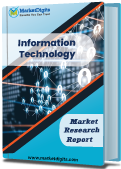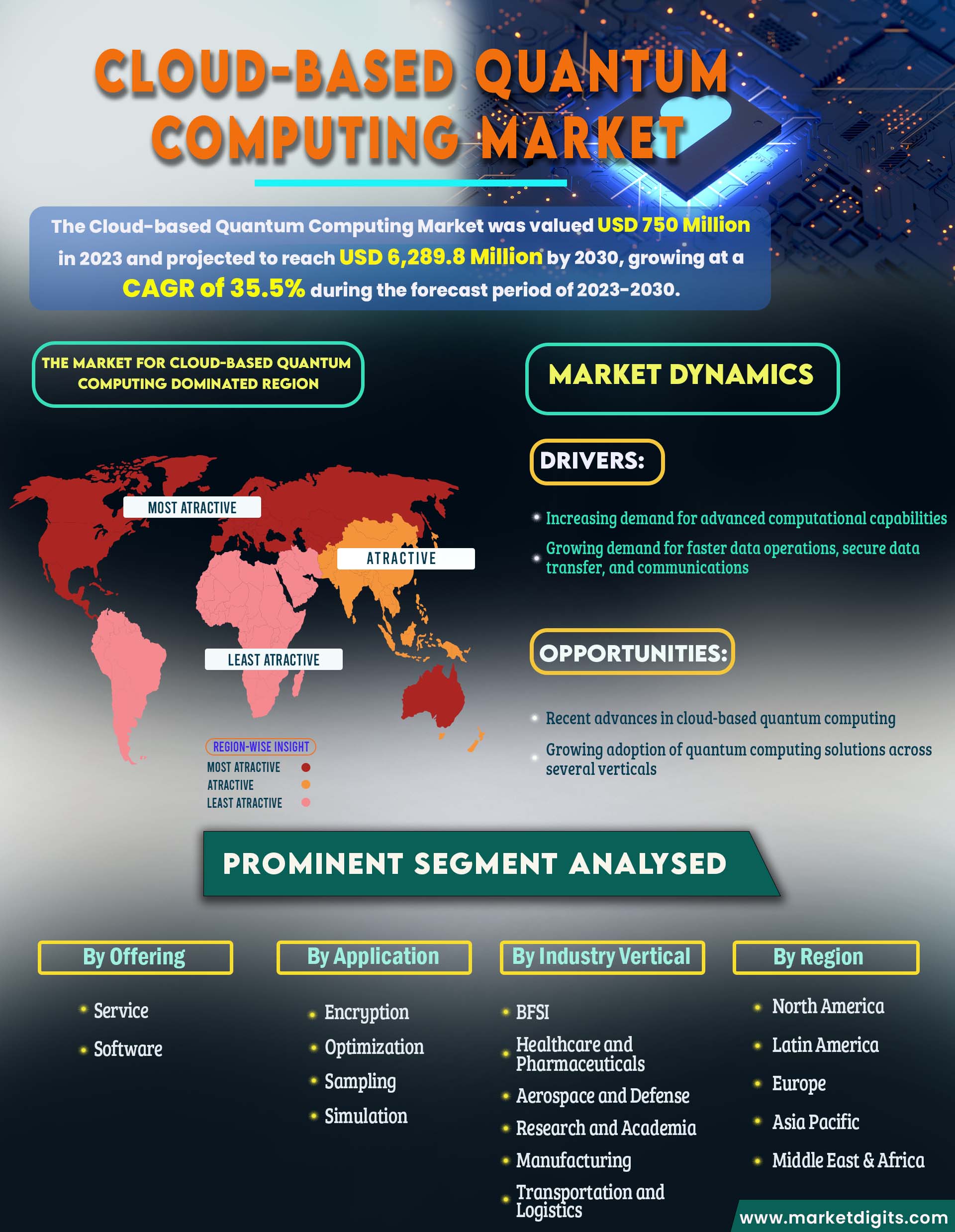- Home
- Information Technology
-
Cloud-based Quantum Computing Market

Cloud-based Quantum Computing Market , by Offering (Service, Software), Technology (Trapped Ions, Quantum Annealing, Superconducting Qubits, Other Technologies, Others), Application, Industry Vertical and Region - Partner & Customer Ecosystem (Product Services, Proposition & Key Features) Competitive Index & Regional Footprints by MarketDigits - Forecast 2024-2032
Industry : Information Technology | Pages : 169 Pages | Published On : May 2024
Market Overview
Cloud-based quantum computing enables remote access to quantum processors and algorithms, revolutionizing computation for diverse applications via online platforms. The cloud-based quantum computing market is experiencing unprecedented growth as organizations seek to harness the immense computational power of quantum processors through convenient and scalable cloud services. This market evolution marks a paradigm shift in computing capabilities, with leading tech companies investing heavily in quantum research and development. Quantum computing leverages the principles of superposition and entanglement to perform complex calculations at speeds unattainable by classical computers. Cloud-based offerings democratize access to quantum resources, allowing businesses to explore and experiment without the need for extensive on-premises infrastructure. As a result, a diverse range of industries, including finance, healthcare, and logistics, are exploring quantum solutions for optimization, simulation, and machine learning applications. The market's trajectory is driven by a convergence of technological advancements, increased investments, and a growing ecosystem of quantum developers and users, positioning cloud-based quantum computing as a transformative force in the future of information processing.
Major vendors in the global Cloud-based Quantum Computing Market are Accenture, AWS (Amazon Web Services), Baidu, Cambridge Quantum Computing, D-Wave Quantum Inc., D-Wave Systems, Fujitsu, Google, Honeywell, Huawei Technologies Co., IBM, 1QBIT, Microsoft, QC Ware, Riverlane, Rigetti Computing, T-Systems International GmbH, and Zapata Computing.
Increasing demand for advanced computational capabilities
The escalating demand for advanced computational capabilities stands as a pivotal driver propelling the cloud-based quantum computing market into prominence. As traditional computing architectures face limitations in solving complex problems, organizations across various sectors are turning to quantum computing to address challenges that were once deemed insurmountable. Cloud-based quantum computing offers a scalable and accessible solution, allowing businesses to harness the extraordinary processing power of quantum processors without the need for significant on-premises infrastructure investments. This surge in demand is fueled by the recognition that quantum algorithms have the potential to outperform classical counterparts in areas such as optimization, cryptography, and machine learning. The advent of cloud-based services democratizes access to quantum resources, empowering a diverse range of industries to explore novel solutions and stay at the forefront of technological innovation in the pursuit of solving complex problems more efficiently and effectively.
Market Dynamics
Drivers:
- Increasing demand for advanced computational capabilities
- Growing demand for faster data operations, secure data transfer, and communications
Opportunities:
- Recent advances in cloud-based quantum computing
- Growing adoption of quantum computing solutions across several verticals
Recent advances in cloud-based quantum computing
Recent advances in cloud-based quantum computing present a significant opportunity for the quantum computing market, opening new frontiers in computation and problem-solving. The integration of cutting-edge technologies into cloud services has enhanced the accessibility and usability of quantum computing resources. Cloud providers are actively investing in infrastructure, algorithms, and developer tools, making quantum computing capabilities more user-friendly and scalable. This progress is fostering a conducive environment for experimentation and innovation, attracting a broader spectrum of users from diverse industries. As cloud-based quantum computing platforms evolve, they offer businesses the chance to explore and harness the potential of quantum algorithms without the need for substantial in-house expertise or infrastructure. This opportunity not only accelerates the adoption of quantum technologies but also democratizes access, empowering organizations to leverage the transformative power of quantum computing to solve complex problems and gain a competitive edge in the rapidly advancing digital landscape.
The market for Cloud-based Quantum Computing is dominated by North America.
North America stands as the dominant force in the Cloud-based Quantum Computing market, with the United States and Canada playing pivotal roles. The region's leadership is attributed to the robust presence of major quantum computing players, significant research and development initiatives, and a burgeoning tech ecosystem. In the United States, companies like IBM, Google, and Rigetti Computing have spearheaded quantum advancements, while Canada boasts prominent players like D-Wave. The strategic collaboration between academia, government, and industry in North America has positioned the region as a global hub for quantum computing innovation, solidifying its preeminence in driving the growth and development of cloud-based quantum computing solutions.
The research and academia Segment is Anticipated to Hold the Largest Market Share During the Forecast Period
Based on Industry Vertical the Cloud-based Quantum Computing Market is segmented into BFSI, Healthcare and Pharmaceuticals, Aerospace and Defense, Research and Academia, Manufacturing, Transportation and Logistics, Others. The research and academia segment is poised to maintain its dominance, holding the largest market size in the Cloud-based Quantum Computing sector throughout the forecast period. This prominence can be attributed to the active involvement of research institutions and academic entities in advancing quantum technologies. These stakeholders play a crucial role in driving innovation, developing quantum algorithms, and educating the workforce. Cloud-based platforms offer an accessible environment for researchers and students to experiment with quantum computing, fostering collaboration and knowledge exchange. As a result, the research and academia segment continues to lead, shaping the trajectory of Cloud-based Quantum Computing's market growth.
Major Segmentations Are Distributed as follows:
- By Offering:
- Service
- Software
- By Technology:
- Trapped Ions
- Quantum Annealing
- Superconducting Qubits
- Other Technologies
- Others
- By Application
- Encryption
- Optimization
- Sampling
- Simulation
- By Industry Vertical:
- BFSI
- Healthcare and Pharmaceuticals
- Aerospace and Defense
- Research and Academia
- Manufacturing
- Transportation and Logistics
- Others
- By Region
- North America
- U.S.
- Canada
- Latin America
- Brazil
- Mexico
- Argentina
- Colombia
- Chile
- Peru
- Rest of Latin America
- Europe
- Germany
- France
- Italy
- Spain
- U.K.
- BENELUX
- CIS & Russia
- Nordics
- Austria
- Poland
- Rest of Europe
- Asia Pacific
- North America
-
- China
- Japan
- South Korea
- India
- Thailand
- Indonesia
- Malaysia
- Vietnam
- Australia & New Zealand
- Rest of Asia Pacific
-
- Middle East & Africa
-
- Saudi Arabia
- UAE
- South Africa
- Nigeria
- Egypt
- Israel
- Turkey
- Rest of MEA
Recent Developments
- In July 2021, D-Wave Systems has introduced its Leap quantum cloud service in India, providing real-time access to commercial quantum computers and Quantum Application Environment (QAE). Users can access Leap's latest version, which includes a Hybrid Solver Service, Integrated Developer Environment (IDE), and Problem Inspector. Additionally, D-Wave's next-generation 5000+ qubits system, Advantage, will be accessible via Leap later this year, along with free developer plans and educational resources.
- In September 2020, China’s Baidu Inc. unveiled a new cloud-based quantum computing platform called Quantum Leaf that is designed to program, model, and perform quantum tasks. Baidu is one of a range of large technology companies that are rushing to create quantum computing, relying on quantum-mechanical processes such as superposition and entanglement to conduct computing. Technology hopes to usher in a new generation in computing and up-to-date fields such as artificial intelligence, cryptography, and physics.
Answers to Following Key Questions:
- What will be the Cloud-based Quantum Computing Market’s Trends & growth rate? What analysis has been done of the prices, sales, and volume of the top producers in the Cloud-based Quantum Computing Market?
- What are the main forces behind worldwide Cloud-based Quantum Computing Market? Which companies dominate Cloud-based Quantum Computing Market?
- Which companies dominate Cloud-based Quantum Computing Market? Which business possibilities, dangers, and tactics did they embrace in the market?
- What are the global Cloud-based Quantum Computing industry's suppliers' opportunities and dangers in Cloud-based Quantum Computing Market?
- What is the Cloud-based Quantum Computing industry's regional sales, income, and pricing analysis? In the Cloud-based Quantum Computing Market, who are the distributors, traders, and resellers?
- What are the main geographic areas for various trades that are anticipated to have astounding expansion over the Cloud-based Quantum Computing Market?
- What are the main geographical areas for various industries that are anticipated to observe astounding expansion for Cloud-based Quantum Computing Market?
- What are the dominant revenue-generating regions for Cloud-based Quantum Computing Market, as well as regional growth trends?
- By the end of the forecast period, what will the market size and growth rate be?
- What are the main Cloud-based Quantum Computing Market trends that are influencing the market's expansion?
- Which key product categories dominate Cloud-based Quantum Computing Market? What is Cloud-based Quantum Computing Market’s main applications?
- In the coming years, which Cloud-based Quantum Computing Market technology will dominate the market?
Reason to purchase this Cloud-based Quantum Computing Market Report:
- Determine prospective investment areas based on a detailed trend analysis of the global Cloud-based Quantum Computing Market over the next years.
- Gain an in-depth understanding of the underlying factors driving demand for different Cloud-based Quantum Computing Market segments in the top spending countries across the world and identify the opportunities each offers.
- Strengthen your understanding of the market in terms of demand drivers, industry trends, and the latest technological developments, among others.
- Identify the major channels that are driving the global Cloud-based Quantum Computing Market , providing a clear picture of future opportunities that can be tapped, resulting in revenue expansion.
- Channelize resources by focusing on the ongoing programs that are being undertaken by the different countries within the global Cloud-based Quantum Computing Market.
- Make correct business decisions based on a thorough analysis of the total competitive landscape of the sector with detailed profiles of the top Cloud-based Quantum Computing Market providers worldwide, including information about their products, alliances, recent contract wins, and financial analysis wherever available.
TOC
Table and Figures
Methodology:
At MarketDigits, we take immense pride in our 360° Research Methodology, which serves as the cornerstone of our research process. It represents a rigorous and comprehensive approach that goes beyond traditional methods to provide a holistic understanding of industry dynamics.
This methodology is built upon the integration of all seven research methodologies developed by MarketDigits, a renowned global research and consulting firm. By leveraging the collective strength of these methodologies, we are able to deliver a 360° view of the challenges, trends, and issues impacting your industry.
The first step of our 360° Research Methodology™ involves conducting extensive primary research, which involves gathering first-hand information through interviews, surveys, and interactions with industry experts, key stakeholders, and market participants. This approach enables us to gather valuable insights and perspectives directly from the source.
Secondary research is another crucial component of our methodology. It involves a deep dive into various data sources, including industry reports, market databases, scholarly articles, and regulatory documents. This helps us gather a wide range of information, validate findings, and provide a comprehensive understanding of the industry landscape.
Furthermore, our methodology incorporates technology-based research techniques, such as data mining, text analytics, and predictive modelling, to uncover hidden patterns, correlations, and trends within the data. This data-driven approach enhances the accuracy and reliability of our analysis, enabling us to make informed and actionable recommendations.
In addition, our analysts bring their industry expertise and domain knowledge to bear on the research process. Their deep understanding of market dynamics, emerging trends, and future prospects allows for insightful interpretation of the data and identification of strategic opportunities.
To ensure the highest level of quality and reliability, our research process undergoes rigorous validation and verification. This includes cross-referencing and triangulation of data from multiple sources, as well as peer reviews and expert consultations.
The result of our 360° Research Methodology is a comprehensive and robust research report that empowers you to make well-informed business decisions. It provides a panoramic view of the industry landscape, helping you navigate challenges, seize opportunities, and stay ahead of the competition.
In summary, our 360° Research Methodology is designed to provide you with a deep understanding of your industry by integrating various research techniques, industry expertise, and data-driven analysis. It ensures that every business decision you make is based on a well-triangulated and comprehensive research experience.

• Product Planning Strategy
• New Product Stratergy
• Expanded Research Scope
• Comprehensive Research
• Strategic Consulting
• Provocative and pragmatic
• Accelerate Revenue & Growth
• Evaluate the competitive landscape
• Optimize your partner network
• Analyzing industries
• Mapping trends
• Strategizing growth
• Implementing plans
Covered Key Topics
Growth Opportunities
Market Growth Drivers
Leading Market Players
Company Market Share
Market Size and Growth Rate
Market Trend and Technological
Research Assistance
We will be happy to help you find what you need. Please call us or write to us:
+1 510-730-3200 (USA Number)
Email: sales@marketdigits.com







